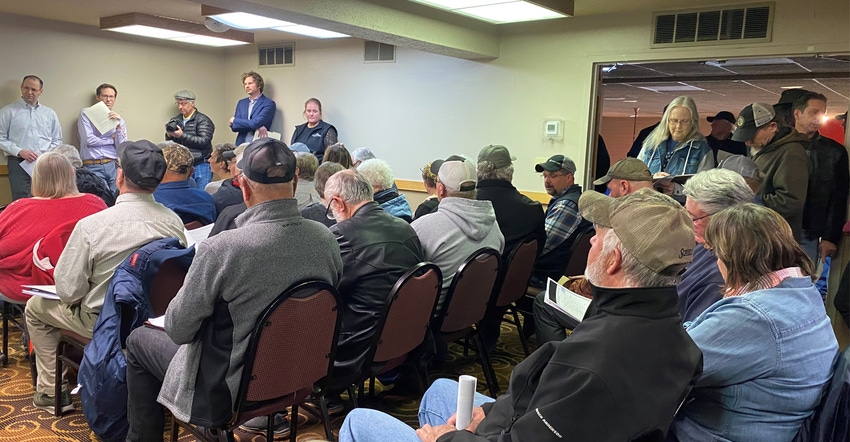
North Dakota Farm Bureau sponsored a recent informative meeting regarding Summit Construction Solutions’ proposed carbon dioxide pipeline in the state. At the meeting, landowners were able to learn about their rights and voice their concerns over the pipeline.
NDFB President Daryl Lies kicked off the meeting in Bismarck. “We’ve got our attorneys here; we’re going to talk through easement contracts,” he said. “We’re used to the oil and gas pipelines, but this is a different deal with the CO2 pipeline, so we’re going to provide as much information as we can to protect private property.”
North Dakota Farm Bureau maintains a neutral stance on the pipeline’s construction, with Lies saying, “We care about looking out for our landowners’ interests.”
This event let landowners ask questions of attorneys and find out more information about the legal steps surrounding easements with the proposed pipeline. The attorneys were Chris McShane, David Piper and Lukas Andrud from the Ohnstead-Twitchell law firm.
“Some of the main information we’ve had from our meetings with Summit have been that there are 32 ethanol plants involved [with the pipeline], with five or six injection wells planned for the area,” Piper said. “The pipeline route is not set yet. They [Summit personnel] will be going to the Public Service Commission in mid-May to get it approved, at which point it will become more concrete.”
With much of the project still needing state approval, many landowners in attendance were left wondering about the implications to their land. “We’ve communicated with them [Summit] on some of these issues we’ve already identified, and they [Summit] are addressing and aware of what we’ve brought to their attention,” Piper said.
Some of the main issues landowners voiced during the meeting included:
liabilities surrounding pipeline reclamation and remediation
eminent domain of private land
protection for properties neighboring the pipeline, who wouldn’t receive easements
funding behind the project
construction indemnification
benefits state receives for housing pipeline
who to contact for correct property surveying
correct and fair language of contracts
reimbursement for landowner’s legal counsel
length of proposed easement (99 years)
land value rates after pipeline construction
leaks near residential or pastureland
restrictions on future construction near pipeline site
“We’re trying to flesh out indemnification language to make sure it is strong and landowner-friendly,” McShane said. “We’ve gotten word back from Summit that they have revised the initial draft to include identification of negligence and related damages.”
He said that their team has high hopes of receiving a more landowner-friendly draft from Summit’s legal team. A main concern at the meeting centered on this being the first carbon dioxide pipeline in the state, and the uncertainty that accompanies that fact.
“We don’t know about the CO2 pipeline because we’ve never had one before,” McShane said.
Concerns around existing drain tiles seemed to be met, with Andrud saying, “They’ve been fairy receptive to going as deep as 7 feet to accommodate.”
Without clear plans in place, the depth of the pipeline should be around 4 feet, except in special accommodations. The pipeline construction would restrict landowners from building a house, barn or bin over the pipeline site.
Landowners were encouraged to make their needs known. What “we need to be talking about is what do they [Summit] need to do to satisfy you [to] make sure that you’re going to be put back in your position to operate as you currently do,” Andrud said.
Payment rates for landowners have not been determined at the date of the meeting, McShane said.
About the Author(s)
You May Also Like






